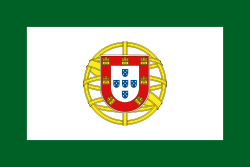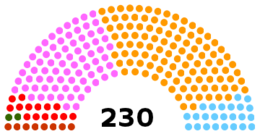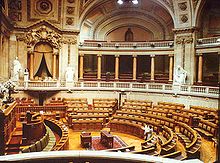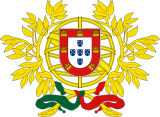- Assembly of the Republic
-
This article is about the Portuguese parliament. For the Mozambique legislature, see Assembly of the Republic of Mozambique. For the Northern Cyprus legislature, see Assembly of the Republic (Northern Cyprus).
Assembly of the Republic
Assembleia da República
Type Type Unicameral Leadership President of the Assembly Maria da Assunção Esteves, Social Democratic
since 21 June 2011Structure Members 230 
Political groups - Social Democratic Party (108)
- People's Party (24)
- Socialist Party (74)
- Communist Party (14)
- Left Bloc (8)
- "The Greens" (2)
Elections Voting system D'Hondt method Last election 5 June 2011 Meeting place 
São Bento Palace, Lisbon, Portugal Website Assembleia da República The Assembly of the Republic (Portuguese: Assembleia da República, pronounced: [ɐsẽˈblɐjɐ dɐ ʁɛˈpublikɐ]) is the Portuguese parliament. It is located in a historical building in Lisbon, referred to as Palácio de São Bento, the site of an old Benedictine monastery. The Palace of São Bento was formerly known as the seat of the National Assembly (Assembleia Nacional) during the Estado Novo regime.
According to the Portuguese Constitution, the unicameral Assembly "is the representative assembly of all Portuguese citizens." The constitution names the assembly as one of the country's organs of supreme authority.
Contents
Powers and duties of the Assembly
The Assembly of the Republic's powers derives from its power to dismiss a government through a vote of no confidence, to change the country's laws, and to amend the constitution (this one requires a majority of two-thirds). In addition to these key powers, the constitution grants to the Assembly extensive legislative powers and substantial control over the budget, the right to authorize the government to raise taxes and grant loans, the power to ratify treaties and other kinds of international agreements, and the duty to approve or reject decisions by the President of the Republic to declare war and make peace. The assembly also appoints many members of important state institutions, such as ten of the thirteen members of the Constitutional Court and seven of the sixteen members of the Council of State.
The constitution requires the assembly to quickly review and approve an incoming government's program. Parliamentary rules allow the assembly to call for committees of inquiry to examine the government's actions. Political opposition represented in the assembly has the power to review the cabinet's actions, even though it is unlikely that the actions can be reversed. Party groups can also call for interpellations that require debates about specific government policies.
Structure
The assembly consisted at first of 250 members, but the constitutional reforms of 1989 reduced its number to between 180 and 230. Members are elected by popular vote for legislative terms of four years from the country's twenty-two constituencies (eighteen in mainland Portugal corresponding to each district, one for each autonomous regions, Azores (Portuguese: Açores) and Madeira, one for Portuguese living in Europe and a last one for those living in the rest of the world. Except for the constituencies for Portuguese living abroad, which are fixed at two members each, the number of voters registered in a constituency determines the number of its members in the assembly, using the D'Hondt method of proportional representation. Constituencies vary greatly in size; from as large as the district of Lisbon, which returns 48 representatives, to as small as the district of Portalegre, which elects just two.
 São Bento Palace, home of the Portuguese Parliament.
São Bento Palace, home of the Portuguese Parliament.
Portugal 
This article is part of the series:
Politics and government of
PortugalConstitutionLegislativeJudiciaryDivisionsForeign policy
According to the constitution, members of the assembly represent the entire country, not the constituency from which they are elected. This directive was reinforced in practice by the strong role of political parties in regard to members of the assembly. Party leadership, for example, determined in which areas candidates were to run for office, thus often weakening members' ties to their constituencies. Moreover, members of the assembly were expected to vote with their party and to work within parliamentary groups based on party membership. Party discipline was strong, and insubordinate members could be coerced through a variety of means. A further obstacle to members' independence was that their bills first had to be submitted to the parliamentary groups, and it was these group leaders who set the assembly's agenda.
The President of the Republic Assembly is the second hierarchical figure in the Portuguese state and is usually nominated by the party that holds the majority of the seats, the President is aided by four vice-presidents, nominated by the other parties represented in the parliament and is usually the speaker, when he is not present, one of the vice-presidents takes the role of speaker. When the President of the Republic is, for any reason, unable to perform to job, the President of the Assembly of the Republic becomes his substitute.
Latest election
Summary of the 5 June 2011 Assembly of the Republic elections results Parties Votes % ±pp swing MPs MPs %/
votes %2009 2011 ± % ± Social Democratic 2,159,181 38.66  9.6
9.681 108  27
2746.96  11.7
11.71.21 Socialist 1,566,347 28.05  8.5
8.597 74  23
2332.17  10.0
10.01.15 People's Party 653,888 11.71  1.3
1.321 24  3
310.43  1.3
1.30.89 Democratic Unity Coalition 441,147 7.90  0.0
0.015 16  1
16.96  0.4
0.40.88 Left Bloc 288,923 5.17  4.6
4.616 8  8
83.48  3.5
3.50.67 PCTP/MRPP 62,610 1.12  0.2
0.20 0  0
00.00  0.0
0.00.0 Party for Animals and Nature 57,995 1.04 — — 0 — 0.00 — 0.0 Earth Party 22,705 0.41  0.3
0.30 0  0
00.00  0.0
0.00.0 Hope for Portugal Movement 21,942 0.39  0.1
0.10 0  0
00.00  0.0
0.00.0 National Renovator Party 17,548 0.31  0.1
0.10 0  0
00.00  0.0
0.00.0 Labour Party 16,895 0.30  0.2
0.20 0  0
00.00  0.0
0.00.0 People's Monarchist Party 14,687 0.26  0.0
0.00 0  0
00.00  0.0
0.00.0 New Democracy Party 11,806 0.21  0.2
0.20 0  0
00.00  0.0
0.00.0 Portugal pro life 8,209 0.15  0.0
0.00 0  0
00.00  0.0
0.00.0 Workers Party of Socialist Unity 4,572 0.08  0.0
0.00 0  0
00.00  0.0
0.00.0 Democratic Party of the Atlantic 4,569 0.08 — — 0 — 0.00 — 0.0 Humanist Party 3,588 0.06 — — 0 — 0.00 — 0.0 Total valid 5,357,037 95.92  1.0
1.0230 230  0
0100.00  0.0
0.0— Blank ballots 148,618 2.66  0.9
0.9Invalid ballots 79,399 1.42  0.1
0.1Total (turnout 58.03%) 5,585,054 100.00  1.7
1.7Source: Comissão Nacional de Eleições Distribution by constituency
Results of the 2011 election of the Portuguese Assembly of the Republic
by constituencyConstituency % S % S % S % S % S Total
SPSD PS CDS–PP CDU BE Azores 47.2 3 25.7 2 12.1 - 2.5 - 4.4 - 5 Aveiro 44.5 8 25.9 5 12.9 2 4.1 - 5.0 1 16 Beja 23.7 1 29.8 1 7.3 - 25.4 1 5.2 - 3 Braga 40.1 9 32.9 7 10.4 2 4.9 1 4.2 - 19 Bragança 52.1 2 26.1 1 11.1 - 2.6 - 2.3 - 3 Castelo Branco 37.9 2 34.8 2 9.6 - 4.9 - 4.2 - 4 Coimbra 40.1 5 29.2 3 9.9 1 6.2 - 5.8 - 9 Évora 27.6 1 29.0 1 8.7 - 22.0 1 4.9 - 3 Faro 37.0 4 23.0 2 12.7 1 8.6 1 8.2 1 9 Guarda 46.3 3 28.3 1 11.2 - 3.6 - 3.4 - 4 Leiria 47.0 6 20.7 3 12.8 1 5.0 - 5.4 - 10 Lisbon 34.1 18 27.5 14 13.8 7 9.6 5 5.7 3 47 Madeira 49.4 4 14.7 1 13.7 1 3.7 - 4.0 - 6 Portalegre 32.5 1 32.4 1 10.2 - 12.8 - 4.5 - 2 Porto 39.2 17 32.0 14 10.0 4 6.2 2 5.1 2 39 Santarém 37.6 5 25.9 3 12.3 1 9.0 1 5.8 - 10 Setúbal 25.2 5 26.9 5 12.1 2 19.6 4 7.1 1 17 Viana do Castelo 43.6 3 26.2 2 13.4 1 4.9 - 4.4 - 6 Vila Real 51.4 3 29.1 2 8.7 - 3.1 - 2.3 - 5 Viseu 48.4 5 26.7 3 12.4 1 2.9 - 2.9 - 9 Europe 29.2 1 39.6 1 5.5 - 4.4 - 3.3 - 2 Rest of the World 55.1 2 18.0 - 4.1 - 0.8 - 1.1 - 2 Total 38.7 108 28.1 74 11.7 24 7.9 16 5.2 8 230 Source: Comissão Nacional de Eleições Presidents
Presidents of the National Assembly
# President Party Term - Albino Soares Pinto dos Reis UN 1945 - 1961 - Mário de Figueiredo UN 1961 - 1969 - Carlos Monteiro do Amaral Neto UN 1969 - 1974 President of the Constituent Assembly
# President Party Term 1 Henrique Teixeira de Queirós de Barros PS 1975 - 1976 Presidents of the Assembly of the Republic
# President Party Term 1 Vasco da Gama Fernandes PS 1976 - 1978 2 Teófilo Carvalho dos Santos PS 1978 - 1980 3 Leonardo Eugénio Ramos Ribeiro de Almeida PSD 1980 - 1981 4 Francisco Manuel Lopes Vieira de Oliveira Dias CDS 1981 - 1982 5 Leonardo Eugénio Ramos Ribeiro de Almeida PSD 1982 - 1983 6 Manuel Alfredo Tito de Morais PS 1983 - 1984 7 Fernando Monteiro do Amaral PSD 1984 - 1987 8 Victor Pereira Crespo PSD 1987 - 1991 9 António Moreira Barbosa de Melo PSD 1991 - 1995 10 António de Almeida Santos PS 1995 - 2002 11 João Bosco Soares da Mota Amaral PSD 2002 - 2005 12 Jaime José de Matos da Gama PS 2005 - 2011 13 Maria da Assunção Esteves PSD 2011–Present See also
- São Bento Palace
- ARtv (Portugal)
Notes
External links
Parliament of Europe Sovereign
states- Albania
- Andorra
- Armenia
- Austria
- Azerbaijan
- Belarus
- Belgium
- Bosnia and Herzegovina
- Bulgaria
- Croatia
- Cyprus
- Czech Republic
- Denmark
- Estonia
- Finland
- France
- Georgia
- Germany
- Greece
- Hungary
- Iceland
- Ireland
- Italy
- Kazakhstan
- Latvia
- Liechtenstein
- Lithuania
- Luxembourg
- Macedonia
- Malta
- Moldova
- Monaco
- Montenegro
- Netherlands
- Norway
- Poland
- Portugal
- Romania
- Russia
- San Marino
- Serbia
- Slovakia
- Slovenia
- Spain
- Sweden
- Switzerland
- Turkey
- Ukraine
- United Kingdom
- (England
- Northern Ireland
- Scotland
- Wales)
States with limited
recognition- Abkhazia
- Kosovo
- Nagorno-Karabakh
- Northern Cyprus
- South Ossetia
- Transnistria
Dependencies
and other territories- Åland
- Faroe Islands
- Gibraltar
- Guernsey
- Jan Mayen
- Jersey
- Isle of Man
- Svalbard
Other entities - European Union
Categories:- Parliaments by country
- Government of Portugal
- Unicameral legislatures
Wikimedia Foundation. 2010.
